Weeks 3-4 in Nepal – The Terai & “See you again”!
A small, lanky chicken scurried past my ankles as yet another droplet of sweat slipped past the edge of my eyebrow and fell into the silty dust beneath my feet. I glanced up and to my left as our host and educator for the day, Ranjana Lamsal, spoke with Parvati Mahato, the woman we had traveled by van over long, bumpy roads to visit. Parvati nodded and replied softly to Ranjana, gently bouncing her young, sleeping daughter in her arms as she spoke. I watched her multitask effortlessly–soothing her daughter as she recounted the story of her family’s dealings with a migration agent who ran away with over half of her family’s savings and forced her husband, Om, to start his foreign employment process from scratch for the second time in the span of a few months. Clearly, performing multiple forms of emotional labor at once was not a novelty for her.
When we arrived at her house, Parvati and her mother–a beautiful, wise-looking older woman with long silver hair and an analytical gaze–dragged as many plastic lawn chairs as they could find out of their house, along with one of the children’s beds, just so that we would have a place to sit for our meeting. I shifted uncomfortably on the bed’s hard, hand-carved wooden frame and taut nylon webbing, temporarily distracted by my mental image of how difficult it would be to sleep on the webbing’s rough knots every night.
The experience of visiting Parvati and hearing her story first-hand, sitting on one of her children’s beds in her yard in rural Nepal, is one that will stay with me for the rest of my life. While we were on our excursion to the Terai, a rural region in southern Nepal, my peers and I were able to visit the homes or neighborhoods of four individuals who had opened cases with the local government’s Migration Resource Center (MRC) to try to achieve justice for exploitation that themselves or their family members had faced/were facing as migrant laborers in Gulf Cooperation Council member-countries. The importance of sharing such personal settings with the individuals and families that we were lucky enough to listen to cannot be undermined–being physically present the places where they carried out their daily routines contextualized their stories and made the experience of learning from our speakers hyper-real for me.
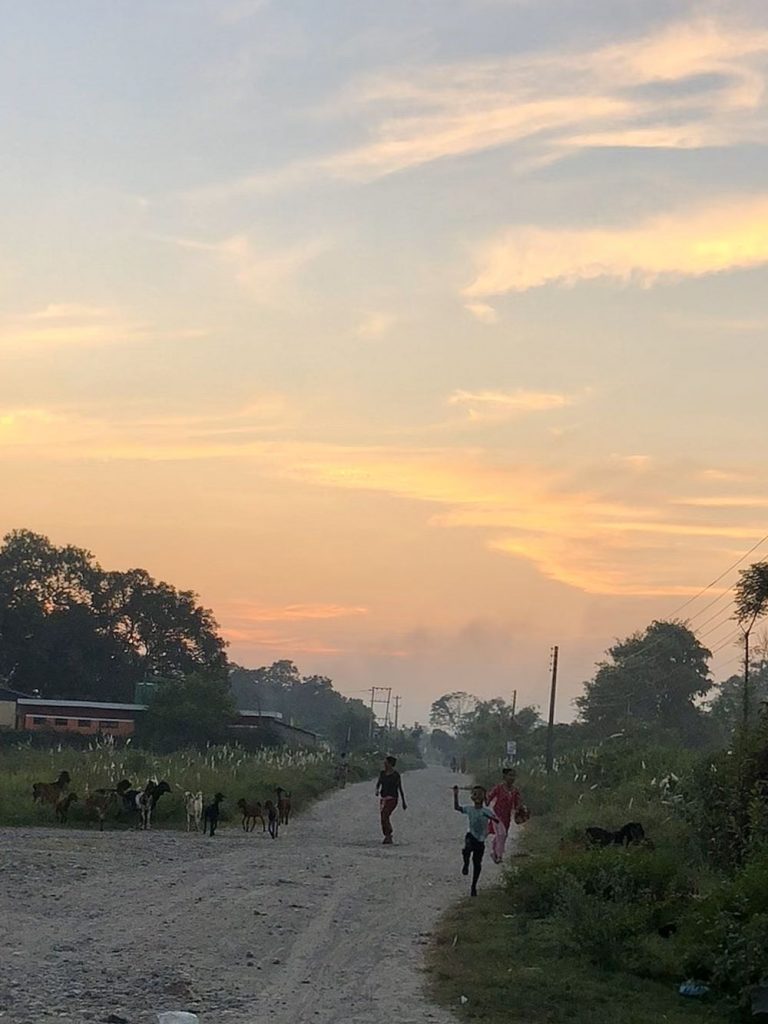
Interacting with each individual we visited–all of them survivors of structural violence at the hands of the Nepali state, the government’s of GCC member-countries, and all the rich politicians in between–through normal conversations was also extremely effective for informing us about the day-to-day realities and consequences of undergoing struggles related to foreign employment within the Nepali/Eurasian/international system. It was because of the personal nature of those conversations that I began to understand what it looks and would feel like day-to-day for a single mom to raise her children without her husband, while he faces inhumane working conditions in Dubai, Qatar, etc. I was able to visualize the daily morning routine: preparing food, waking the children, getting them ready for school and/or work, feeding the animals, cleaning up the house, trying to get in touch with the relative abroad to check on them and receive information about how to advocate for them from thousands of miles away, and then making more phone calls or a long visit to the RMC to pass along information from the relative to case workers. If we hadn’t been sitting there in Parvati’s yard though, face-to-face with both the joy and struggles of her life, I don’t think I would have gained the same understanding.
Another thing that became abundantly clear to us through our site visits in the Kawasoti province of the Terai and beyond was the imperativeness of the Safer Migration (SaMi) program and the presence of the MRC in each district of Nepal. At one point during our site visits, Ranjana looked at each of us and said, “Now you see how important it is that we are here. If SaMi wasn’t here, who would advocate for justice for these families? It wouldn’t happen.” That concept stayed with me for the entire rest of the day and throughout the next as well, when we went to visit the local government office of Kawasoti. Our presentation experiences in the government buildings we visited in Terai were also highly informative, but they felt much staler than our interactions with the individuals and families that Ranjana introduced us to during our site visits.
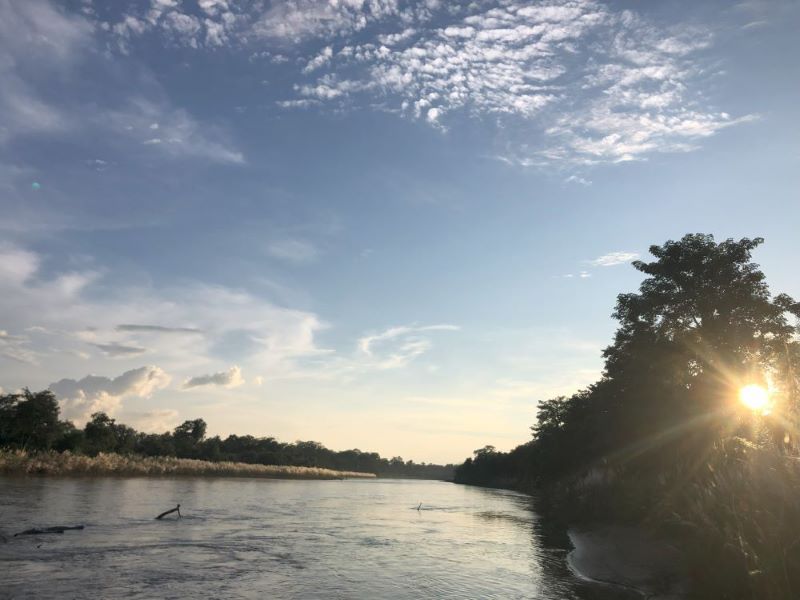
Prior to those interactions, when we were listening to representatives of the MRC speak, I was more passively interested in what the speakers were talking about. The presentation took on a completely different meaning, however, when MRC clients began climbing the stairs and poking their heads into the room where we sat, asking for directions to one office or another to handle cases, inquire about services, look over documents, etc. The faces that appeared in the doorway were the reason that we were there- they were the manifestations of the knowledge and data being served to us on projected powerpoint slides, and it was only after I allowed myself to realize the weight of that connection that I became fully invested in what was going on around me.
Similarly, I don’t think I would have gotten nearly as much out of our visit to the Kawasoti municipality’s local government office had I not met Ranjana’s clients at their homes the day before. Honestly, the Kawasoti judicial committee presentation brought up a lot of anger and frustration for me, and I think I was feeling that way because I had fresh conversations with local people spinning around inside my head and providing personal, anecdotal context to the information we were being fed about Nepali policy and government structure. The Deputy Mayor explained the limitations of the power of local governments as that applies to bringing justice to labor migrants whose perpetrators flee to different provinces or countries, about her stance on divorce and the state’s involvement in domestic affairs, about the complexities of the civil vs. criminal case divide in terms of how the state can allocate resources to survivors, etc.
As she spoke, all I could think about was Parvati’s face as she held her daughter–the shadows under her eyes and the determination in the way she clenched her jaw. I thought of the young boy whose father committed suicide after returning from working abroad–I remembered the boy’s quiet resilience, how his life and mind have forever been altered by the struggles he inherited from his father during his early teenage years. How could the Deputy Mayor have such an honest, comprehensive understanding of the issues faced by this extremely vulnerable population in her community and seem to relay this information to us as if it was the most normal thing in the world? In the moment, I knew my anger was directed at the wrong person, the wrong place, but I couldn’t help but want to stand up and shout, “Yes! And do you have any idea how these policies are inflicting violence upon the people your government claims to represent and care for?”.
Once I had calmed down enough to think critically again, I eventually accepted that the Deputy Mayor must care deeply for her community to do the work she does, and that she and her colleagues are helping migrant workers in whatever ways they reasonably can–it’s the dynamics of the Nepali state that do not allow local governments to take much direct action, not individual negligence. I thought to myself, of course the Deputy Mayor and her colleagues can feel the pain of their community, and perhaps the frankness of her communication may just be an indicator of how long she has had to grapple with this kind of knowledge and how she has learned to cope with it.
It’s still frustrating that Nepali’s local governments are not able to do more to help prevent further harm in the future, but it’s thanks to women and workers like Ranjana that labor migrants at all stages can have some hope for justice and safety while abroad. Balancing the need for further progress with the ability to have gratitude for the social resources that already exist in rural Nepal is a tricky line to walk, and it’s a line I found myself walking every day in the Terai. My gratitude for being there and having the opportunity to learn from so many people with such different life stories is clear and undeniable, though–this experience has changed my worldview profoundly, and it is one that I’ll never forget.
– – – – – – – – – – – – – – – – – – – – – – – – – – – – – –
As I stepped through the dark wooden doorway, I wasn’t sure what to expect–Kat and I had been anxiously awaiting seeing this room of our homestay house for weeks, as it was one of the only rooms we hadn’t yet explored and we knew that it housed beautiful artwork. Nothing could have prepared me for the depth, detail, intricacy, and delicate beauty of the statues that arched and sat and danced and stomped before me, though. They looked so real, so divinely powerful, as if they might unfreeze and wield their mightiness upon us at any given second. Kat and I were mesmerized, so much so that we momentarily forgot that the quiet, humble man with endearing crow’s feet who padded quietly into the room behind us had created these figures with a few simple tools and deft skill of his calloused hands.

These were the kinds of moments that Kat and I found ourselves reflecting upon days later as we sat on yet another bougie Qatar Airways flight, sad to be leaving Nepal and excited for what lay ahead of us in Jordan. Before boarding, Yanik and his team had organized a lovely, tear-jerking final dinner with our homestay families. We all met at a cute cafe’s outdoor garden, and we exchanged gratitude and memories and more than a few glasses of wine underneath the twinkling party lights that were strung above us. Our host dad, Krishna, had a way of making Kat and I laugh that was totally unique–somehow, dad jokes are dad jokes anywhere in the world, and he definitely capitalized on his final opportunity to share them with us.
In our conversations about all that we had learned during our brief time in Nepal, I found myself thinking about how in a past life, I could have been like any of these wonderful people that I had met halfway around the world, and they could easily have been like me. It was a unifying thought–the comfort that we all share our humanity and the capacity to empathize with one another across our differences is profound.
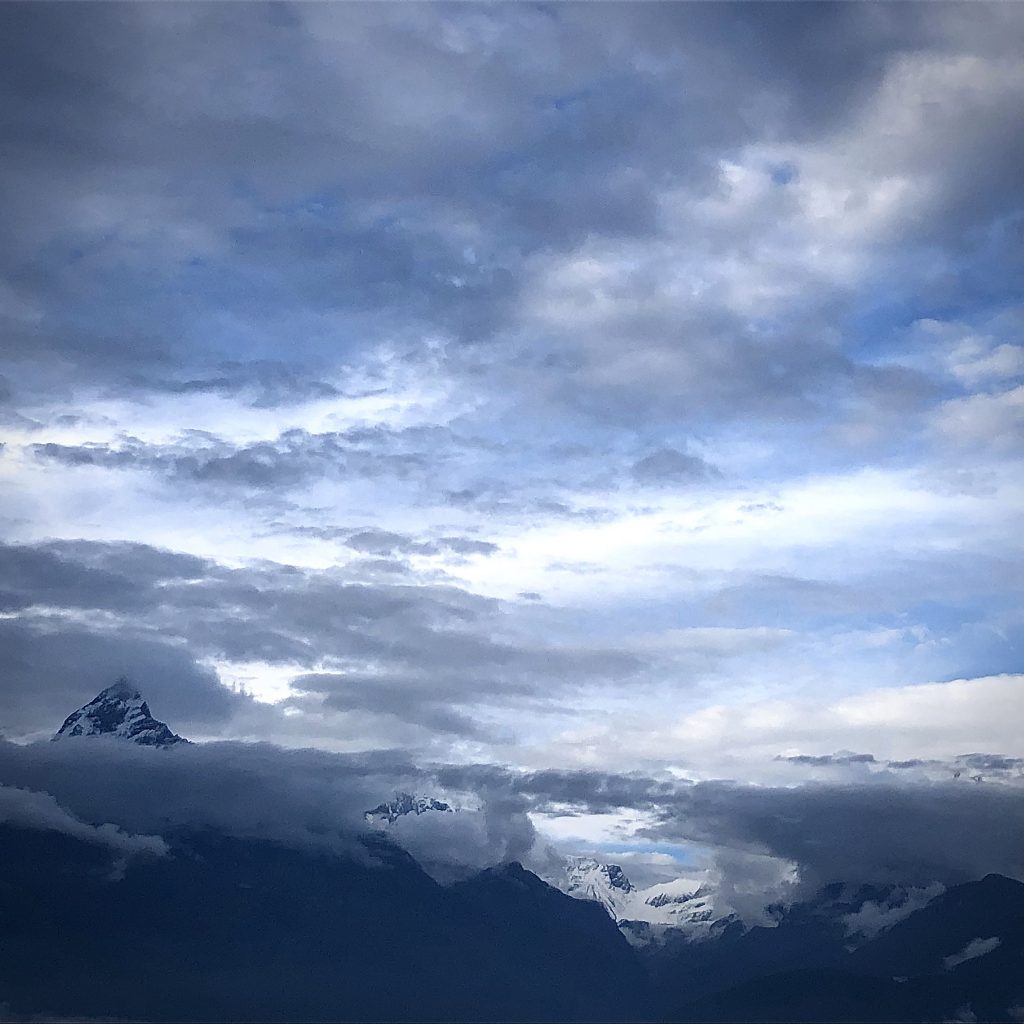
I also found myself remembering our 22-hour bus ride back from Pokhara, a mountainous city full of beautiful cafes where gangsters launder their money and where ferryman spend their days paddling people across the city’s yawning lake.
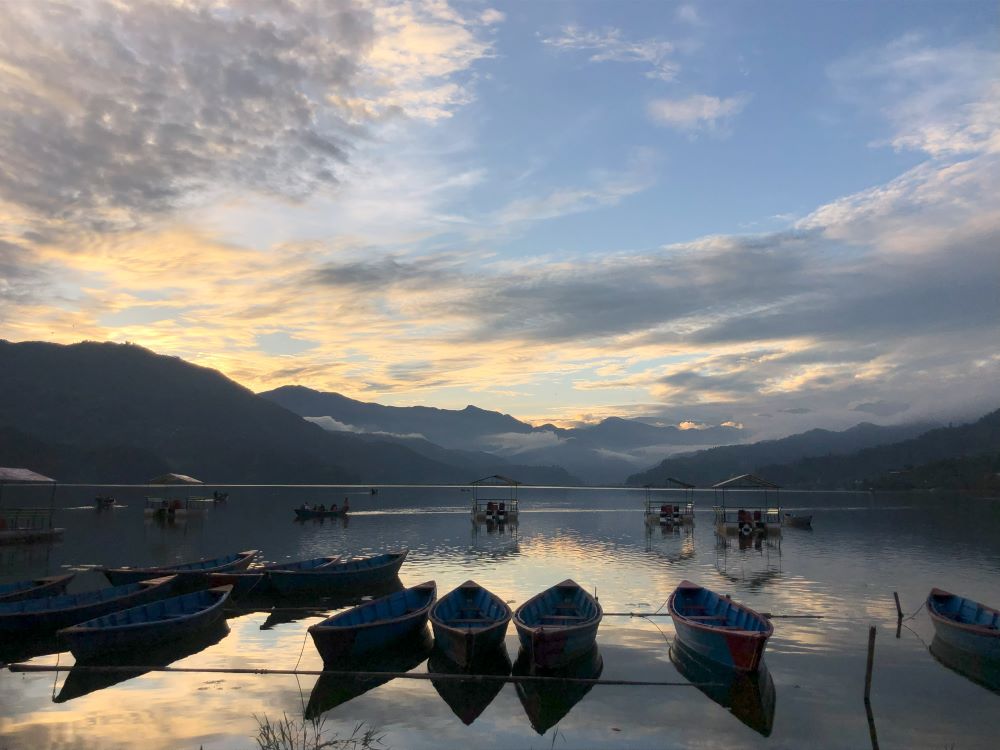
My cohort ended up spending one more day than originally planned in Pokhara due to the devastating flooding that recently tore through the floodplains of Nepal and tore up the country’s roads, causing landslides and traffic and slowing down the provision of essential disaster-relief resources to affected areas. The flooding was severe–Nepal received half of it’s annual rainfall in two days, and despite the fact that government officials had been warned ahead of time of the impending storm, preventative measures were not taken to protect the lives and livelihoods of the populations most at risk. In recent years, working class communities (often comprised of daily-wage workers) have settled in haphazardly developed housing on the banks of the Bagmati River and its floodplains. This is the only place that many of these families can afford to live, and they suffered and lost the most at the hands of the recent flooding.
My cohort and I were extremely lucky, as were our host families in Patan, to have our lives and homes left intact in the wake of the floods. My peers and I did suffer, however, when we were confined inside our tourist bus for 22 hours on the trip back from Pokhara due to landslides, Indian drivers in massive, colorful trucks (colloquially known as “tippers”) asleep at the wheel with their engines cut off in the middle of the road, and a mass exodus of people trying to reach family members in need or on a journey to find refuge on higher ground. The journey was brutal- the day before, we had geared up for an eight-hour bus ride, but nothing could have prepared us for the claustrophobia, desperate humor, waves of helplessness, and ultimately, the strong group solidarity that we encountered while we were trapped on that bus.
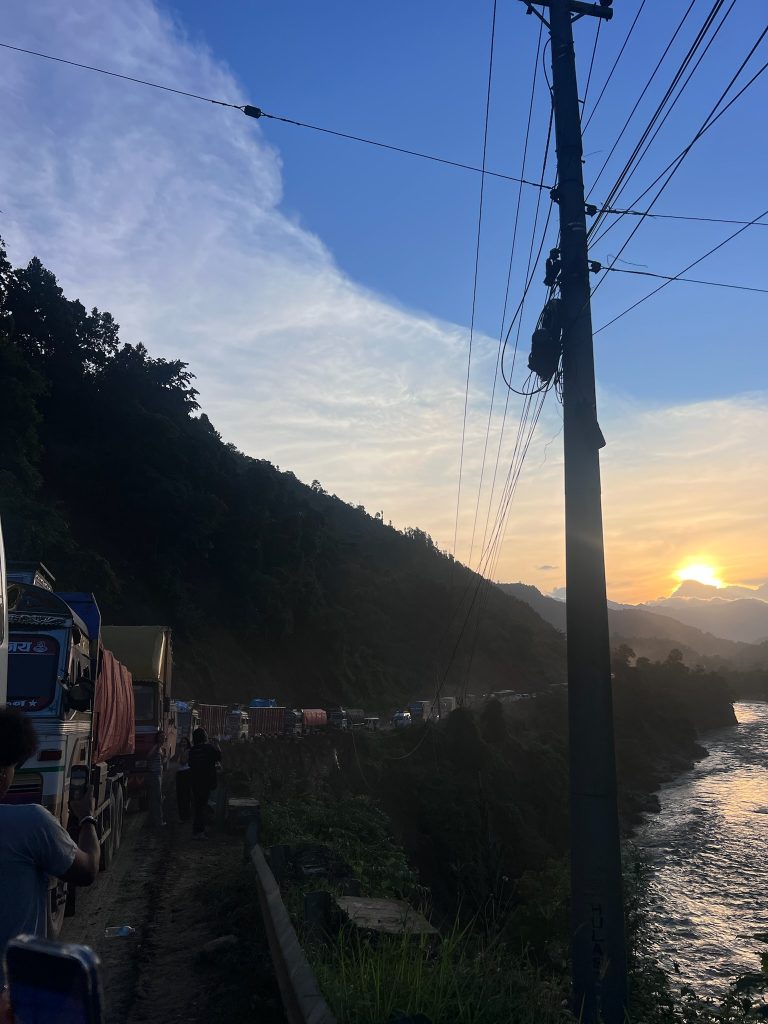
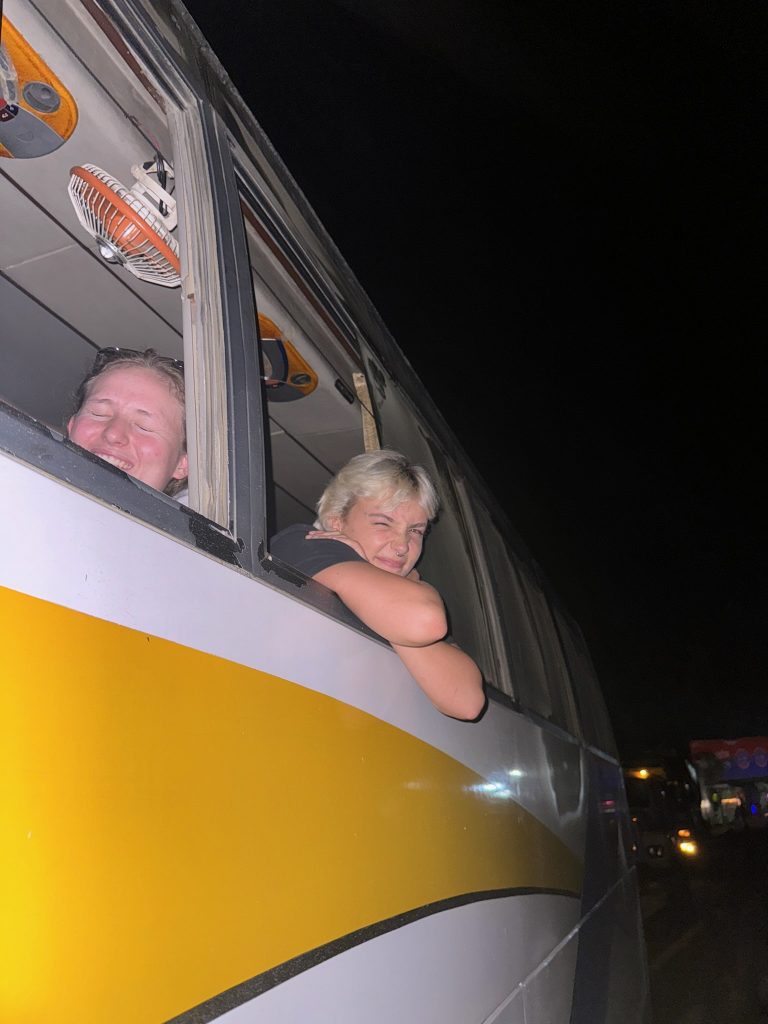
Once again, Krishna set the absolute highest standard for the seriousness with which he took our collective safety and wellbeing as a member of our student support staff, but also as a true friend of us all. During many occasions in the wee hours of the morning, when we were stuck at absolute standstills due to the tipper drivers decisions to take naps in the middle of the road, Krishna got out of the bus and banged on the sides of the trucks to wake the drivers so that we could move forward. He would then lead us ON FOOT through a maze of moving/non-moving vehicles with haphazard headlights pointing this way and that until we had made it clear to the other side of the blockade. This process definitely put him in harms way, as many of the drivers were barely awake, but Krishna showed no fear- he was like Moses, parting the tipper-sea for us. When he was back on the bus, he made sure to check in with everyone and provided us with water to keep us hydrated, dark humor to keep us smiling and grounded, and hugs when we started to go a little cray. He is such an awesome human being, and many tears were shed when we were forced to say “see you again”. I can’t wait for my post-undergrad return to Kathmandu to reunite with him and my host family, and to send the Annapurna circuit as a team with him and Ellie and Sarah!
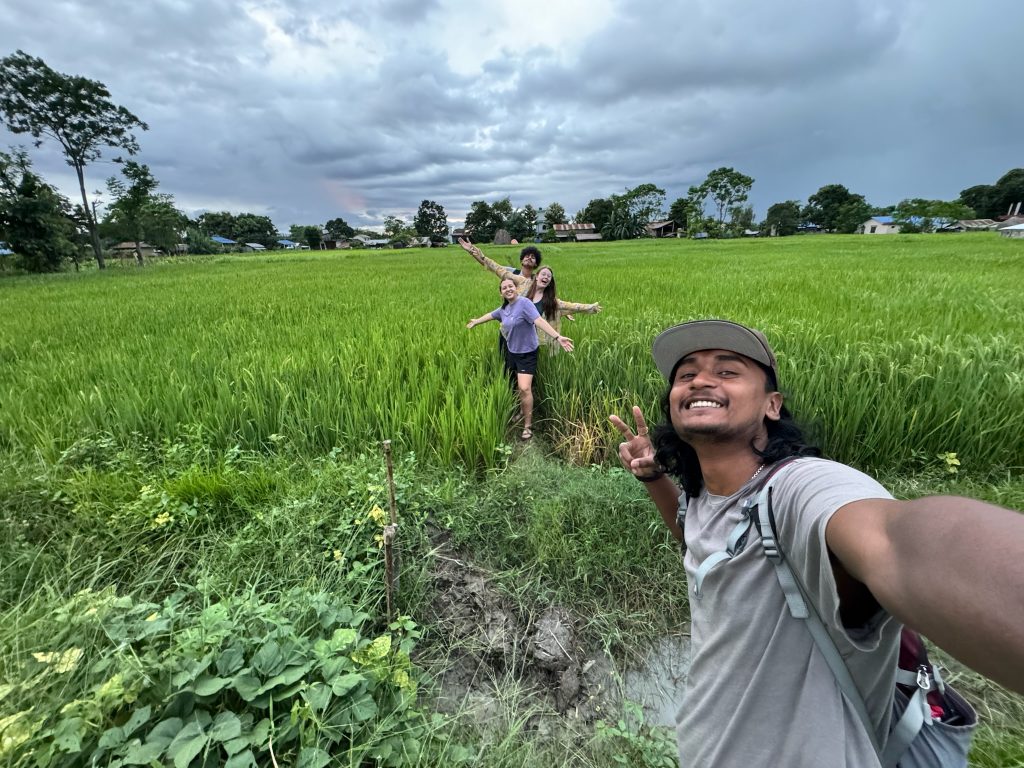
There were so many epic, bonding moments, so many life-changing conversations had between me and Krishna and Nirvana and Laboni and Yanik and my peers and our guest-lecturers and our host families, so many beautiful sunrises and evening walks back home from our beloved classroom space- It would take years to recount all that has happened in the last month to the degree that these experiences deserve, but alas, time marches on and so do I! As I sit here writing this from our hotel in Jordan, I must now begin to chronicle the incredibly different, equally fascinating and growth-inducing experience we have already begun to have here. In Nepal, they do not say goodbye- only see you again! Now we have said Salaam Alaikum to Jordan… more on this soon.
October 8, 2024
Comments are closed.